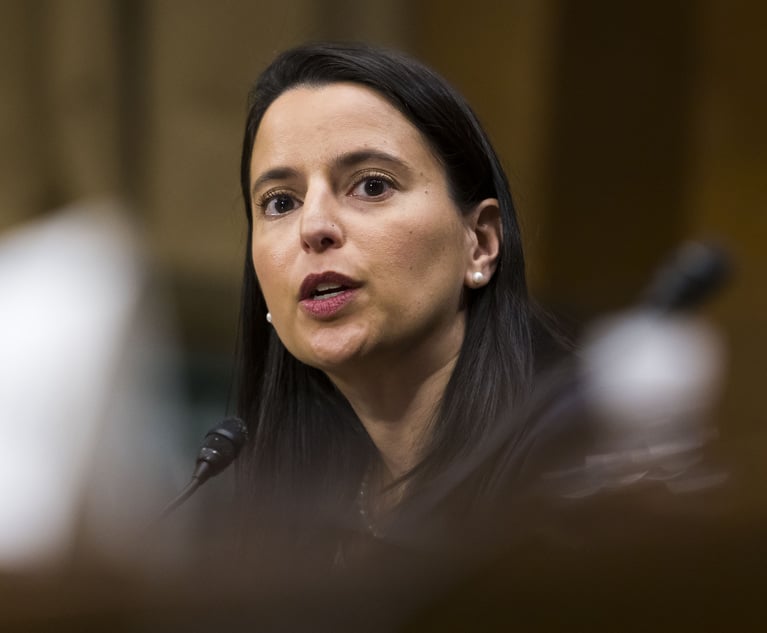Revamped Judicial Misconduct System Could Allow Online Complaints
A top official stopped short of endorsing a recommendation to split the Commission on Judicial Performance's investigative and disciplinary duties.
June 12, 2019 at 06:18 PM
3 minute read
 Sacramento State Capitol building on Capitol Way. Credit: Jason Doiy /ALM
Sacramento State Capitol building on Capitol Way. Credit: Jason Doiy /ALM
The top official at California's Commission on Judicial Performance told state lawmakers Wednesday he is committed to making the changes recommended in a recent audit that criticized the watchdog agency.
Gregory Dresser, the commission's director and chief counsel, said staff have already been instructed on how to better track allegations against judges to spot potential patterns of misconduct. A new process will require managers to review and approve investigative strategies, he said, and agency leaders are considering moving the office from San Francisco in a cost-cutting move.
“The intention is for the things that we can do without extra funding to do them by the dates recommended,” Dresser said.
Dresser stopped short, however, of endorsing the auditor's recommendation to split the commission's investigative and disciplinary duties. Currently, commissioners decide whether staff should pursue a full investigation of allegations against a judge and then whether and how that judge should be disciplined.
That structure, Auditor Elaine Howle said, exposes commissioners to unproven allegations about a judge that should not factor into their decisions about punishment.
Dresser said state Supreme Court opinions have found the current system does not violate a judge's right to due process. Any changes to the commission's process would require an amendment to the state constitution.
“In terms of amending the constitution, the commission believes that's a policy decision for the Legislature and ultimately the voters to make,” Dresser said. “My plea is that that is something that is done with precision and care.”
Howle's report, issued in April, was the first state audit of the disciplinary agency in its 59-year history.
 Elaine Howle
Elaine HowleHowle's team concluded that commission investigators too often did not take “all reasonable steps” in reviewing allegations leveled against judges.
The agency also failed to look for patterns of misbehavior in judges, the report concluded, noting that the commission received eight similar allegations of on-the-bench misconduct against one judge over a five-year period but did not pursue discipline until one complainant produced a transcript. The judge ultimately agreed “in a confidential settlement” to resign and never seek office again.
Dresser said the agency is working on the purchase of a new case management system that would allow investigators to better track allegations while also permitting the public to file complaints online. Currently, complaints must be sent to the commission by mail, a process Howle called “archaic.”
Lawmakers have not yet endorsed amending the constitution to restructure the commission although they suggested Wednesday that changes will be proposed.
“The Legislature stands ready to do what we need to do to ensure the statutes, the laws and even the constitution are appropriately modified so the CJP can function and build back trust with the public across California,” Assemblyman Mark Stone, D-Scotts Valley, said.
Read more:
First-Ever Audit of Judicial Watchdog Faults 'Missed Opportunities'
Judicial Discipline Records Face First-Ever Audit After Deal Ends Dustup
Inside The Recorder's Request for Judicial Workplace Harassment Records
This content has been archived. It is available through our partners, LexisNexis® and Bloomberg Law.
To view this content, please continue to their sites.
Not a Lexis Subscriber?
Subscribe Now
Not a Bloomberg Law Subscriber?
Subscribe Now
NOT FOR REPRINT
© 2025 ALM Global, LLC, All Rights Reserved. Request academic re-use from www.copyright.com. All other uses, submit a request to [email protected]. For more information visit Asset & Logo Licensing.
You Might Like
View All
Judge Accuses Trump of Constitutional End Run, Blocks Citizenship Order
3 minute read
Chicago Law Requiring Women, Minority Ownership Stake in Casinos Is Unconstitutional, New Suit Claims
5 minute read
Trending Stories
- 1Litigators of the Week: US Soccer and MLS Fend Off Claims They Conspired to Scuttle Rival League’s Prospect
- 2Litigator of the Week Runners-Up and Shout-Outs
- 3U.S.- China Trade War: Lawyers and Clients Left 'Relying on the Governments to Sort This Out'
- 4Willkie Adds Five-Lawyer Team From Quinn Emanuel in Germany
- 5AI Discrimination and the 10-Step Bias Elimination Audit
Who Got The Work
J. Brugh Lower of Gibbons has entered an appearance for industrial equipment supplier Devco Corporation in a pending trademark infringement lawsuit. The suit, accusing the defendant of selling knock-off Graco products, was filed Dec. 18 in New Jersey District Court by Rivkin Radler on behalf of Graco Inc. and Graco Minnesota. The case, assigned to U.S. District Judge Zahid N. Quraishi, is 3:24-cv-11294, Graco Inc. et al v. Devco Corporation.
Who Got The Work
Rebecca Maller-Stein and Kent A. Yalowitz of Arnold & Porter Kaye Scholer have entered their appearances for Hanaco Venture Capital and its executives, Lior Prosor and David Frankel, in a pending securities lawsuit. The action, filed on Dec. 24 in New York Southern District Court by Zell, Aron & Co. on behalf of Goldeneye Advisors, accuses the defendants of negligently and fraudulently managing the plaintiff's $1 million investment. The case, assigned to U.S. District Judge Vernon S. Broderick, is 1:24-cv-09918, Goldeneye Advisors, LLC v. Hanaco Venture Capital, Ltd. et al.
Who Got The Work
Attorneys from A&O Shearman has stepped in as defense counsel for Toronto-Dominion Bank and other defendants in a pending securities class action. The suit, filed Dec. 11 in New York Southern District Court by Bleichmar Fonti & Auld, accuses the defendants of concealing the bank's 'pervasive' deficiencies in regards to its compliance with the Bank Secrecy Act and the quality of its anti-money laundering controls. The case, assigned to U.S. District Judge Arun Subramanian, is 1:24-cv-09445, Gonzalez v. The Toronto-Dominion Bank et al.
Who Got The Work
Crown Castle International, a Pennsylvania company providing shared communications infrastructure, has turned to Luke D. Wolf of Gordon Rees Scully Mansukhani to fend off a pending breach-of-contract lawsuit. The court action, filed Nov. 25 in Michigan Eastern District Court by Hooper Hathaway PC on behalf of The Town Residences LLC, accuses Crown Castle of failing to transfer approximately $30,000 in utility payments from T-Mobile in breach of a roof-top lease and assignment agreement. The case, assigned to U.S. District Judge Susan K. Declercq, is 2:24-cv-13131, The Town Residences LLC v. T-Mobile US, Inc. et al.
Who Got The Work
Wilfred P. Coronato and Daniel M. Schwartz of McCarter & English have stepped in as defense counsel to Electrolux Home Products Inc. in a pending product liability lawsuit. The court action, filed Nov. 26 in New York Eastern District Court by Poulos Lopiccolo PC and Nagel Rice LLP on behalf of David Stern, alleges that the defendant's refrigerators’ drawers and shelving repeatedly break and fall apart within months after purchase. The case, assigned to U.S. District Judge Joan M. Azrack, is 2:24-cv-08204, Stern v. Electrolux Home Products, Inc.
Featured Firms
Law Offices of Gary Martin Hays & Associates, P.C.
(470) 294-1674
Law Offices of Mark E. Salomone
(857) 444-6468
Smith & Hassler
(713) 739-1250







